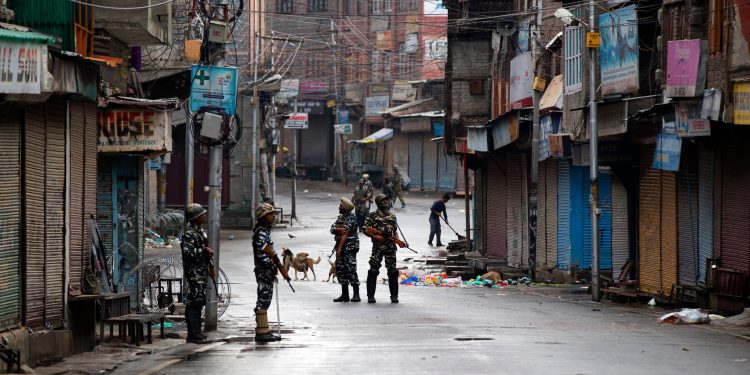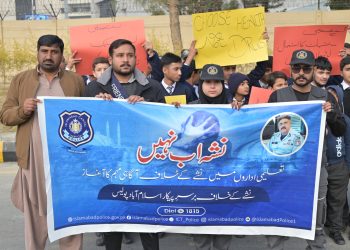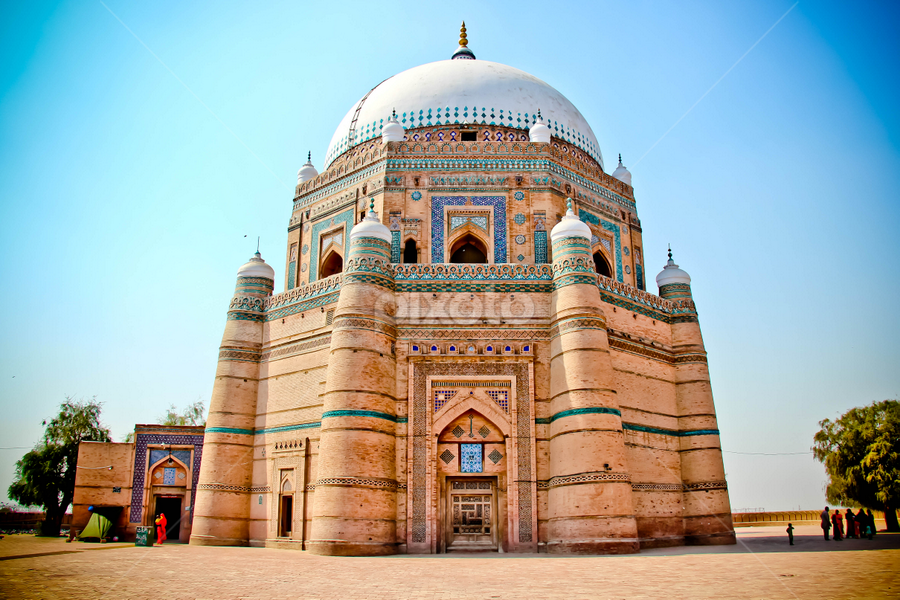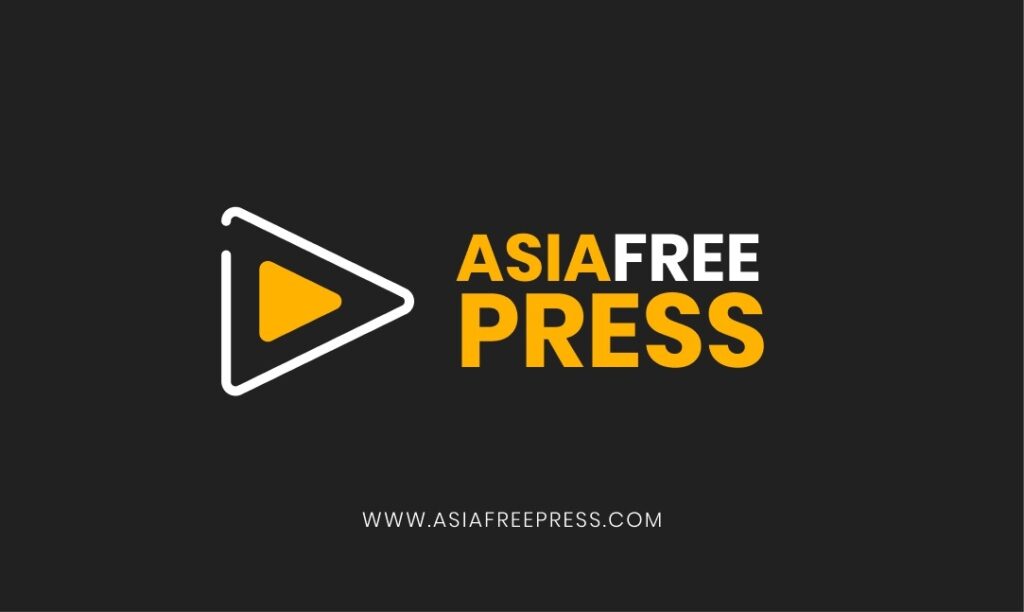Indian paramilitary troopers patrol a deserted street in Srinagar after India revoked Kashmir’s special status in August 2019. In August 2019, India’s Hindu-nationalist government undertook a unilateral and unprecedented move in Indian-occupied Kashmir, revoking the region’s special autonomous status and splitting it into federally controlled territories. This decision, made without any consultation of the Kashmiri people or their representatives, was enforced by a massive security clampdown. Overnight, Jammu and Kashmir was placed under siege: tens of thousands of additional troops flooded the streets, a sweeping curfew emptied city centres, and phone and internet lines were cut, severing millions of people from the outside world. In the days and weeks that followed, thousands of Kashmiris, from veteran political leaders to teenage boys, were arbitrarily detained, with reports of kids as young as 9 or 10 picked up in nocturnal raids. Six years later, the human rights situation in Kashmir remains dire, and India’s August 2019 actions stand as a glaring affront to international law, violating United Nations Security Council resolutions, the Geneva Conventions, and the fundamental right of a people to self-determination.
Human Rights Violations in a Silenced Valley
The human toll of India’s August 2019 crackdown in Kashmir has been devastating. In the immediate aftermath, Kashmir was effectively cut off and silenced. More than 4,000 people were reportedly taken into custody within weeks, including opposition politicians, activists, journalists, and even children, under draconian security laws that allow detention without charge. A region-wide communications blackout was imposed, plunging residents into an information void. Even vital services like healthcare and education were paralysed as mobile networks and internet were shut for months on end (high-speed internet was only restored after 18 months, marking one of the world’s longest shutdowns). This collective punishment on an entire population underscored what Human Rights Watch called the government’s effort to ‘shut down Kashmir, hiding the full extent of the harm caused there’.
In the three years that followed, the Indian authorities intensified their repression in Kashmir, aiming to choke off any form of dissent. Amnesty International documents a ‘vicious crackdown’ on civil society journalists, lawyers, human rights defenders, and ordinary citizens have faced relentless harassment under a slew of repressive measures. At least 27 journalists have been arrested since 2019 for their reporting, many of them subjected to ‘revolving door’ detentions granted bail by a court only to be immediately re-arrested under the draconian Unlawful Activities (Prevention) Act (UAPA) on new trumped-up charges. Independent media in the region has been gutted: authorities imposed new media policies to tightly control reporting, repeatedly suspended internet services on flimsy pretexts, and even forcibly dissolved the Kashmir Press Club, the valley’s largest journalists’ association in 2022.‘The cost of pursuing journalism in Jammu & Kashmir is huge’, one harassed Kashmiri reporter told Amnesty, encapsulating the climate of fear.
Ordinary Kashmiris continue to suffer daily indignities and abuses. Security forces enforce frequent curfews and checkpoint restrictions on movement. There are credible allegations of excessive force, including the continued use of pellet-firing shotguns that have blinded and maimed hundreds of protesters in recent years (a practice criticised as brutal and indiscriminate by the UN). Dozens of civilians have been killed in disputed encounters, including cases of extrajudicial execution. Torture and ill-treatment of detainees, a long-running concern in Kashmir, persist under a cloak of impunity shielded by laws like the Armed Forces Special Powers Act (AFSPA), which effectively immunises troops from prosecution. The justice system offers little recourse: many of those swept into detention since 2019 remain held without charge or trial, including children and teens who languish in jail under so-called preventive detention orders. As a result of the crackdown, livelihoods have been lost and education disrupted – an entire generation growing up under siege. The United Nations, the European Parliament, and international human rights groups have repeatedly voiced alarm over these abuses, from enforced disappearances to the communications blackout. Yet India has dismissed or ignored such criticism, insisting its actions are an ‘internal matter’. Meanwhile, for the people of Kashmir, the promises of democracy and human rights have never felt more distant.
Flouting International Law: From the UN Charter to the Geneva Conventions
Beyond the humanitarian crisis, India’s August 2019 measures in Kashmir represent a blatant violation of international law and the global norms meant to prevent exactly this kind of unilateral coercive action. The UN Charter – the foundational treaty of the international order – enshrines the principle of self-determination of peoples and forbids the acquisition of territory by force. Yet New Delhi’s actions effectively annexed a disputed territory whose people were long promised the right to decide their political future. In the late 1940s, the United Nations Security Council passed a series of binding resolutions on the Kashmir dispute, affirming that the final status of Jammu and Kashmir shall be decided by the will of its people expressed through a free and impartial plebiscite. Critically, the Security Council explicitly warned that no unilateral steps by either India or Pakistan could ‘determine the future shape and affiliation of the state’ – any such attempt would lack legal effect in settling the dispute. India’s decision in 2019 to unilaterally absorb and reorganise Kashmir brazenly defied these UN resolutions, flouting an international commitment to which India itself had once agreed. As the President of the UN General Assembly reaffirmed in 2021, ‘the United Nations’ position on Jammu and Kashmir is governed by the UN Charter and applicable Security Council resolutions’. By undermining this position, India’s move strikes at the heart of the UN’s credibility and authority.
India’s disregard for international norms extends to international humanitarian law, notably the Geneva Conventions. Many observers and legal experts view Indian-administered Kashmir as an occupied territory, given the heavy military presence and the contested status of the region. Under the Fourth Geneva Convention (Article 49), an occupying power is strictly forbidden from transferring its own civilian population into the territory it occupies or making permanent changes to that territory’s demographic composition. Yet, since August 2019, the Indian government has pursued policies that critics describe as a settler-colonial project aimed at engineering a demographic shift in Muslim-majority Kashmir. Protections that had reserved land ownership and jobs for long-time residents were scrapped. New domicile laws were introduced to encourage Indians from outside Kashmir to resettle there, granting them rights to own property and vote in local elections for the first time in history. In a short span, millions of domicile certificates were issued under the new rules, and by 2025, at least 83,000 non-local settlers had been officially granted residency rights in Kashmir. These moves have been accompanied by large-scale seizures of Kashmiri land for development projects and security installations. The aim, as Kashmiri activists and international lawyers warn, is to dilute the indigenous population’s political clout and permanently alter the region’s identity – a tactic strikingly similar to unlawful settlement enterprises in other occupation contexts. Such demographic engineering violates UN Security Council resolutions and the 4th Geneva Convention, amounting to ‘war crimes’. Indeed, under international law, attempting to change an occupied territory’s demographics or legal status by fiat is null and void; it does not confer lawful sovereignty. By imposing its laws, bureaucratic structures, and population transfers on Kashmir, India is breaching fundamental international conventions and eroding the norms that safeguard civilians in conflict zones.
International human rights law has also been trampled in this process. India is a state party to treaties like the International Covenant on Civil and Political Rights (ICCPR), which guarantees basic freedoms – the right to free expression, assembly, movement, and the right of peoples to determine their political status. Yet in Kashmir, political participation and free expression have been relentlessly stifled, and the people’s collective will overridden, in clear breach of these obligations. The Universal Declaration of Human Rights, too, proclaims that governance must be based on “the will of the people” – a tenet given zero regard when Kashmir’s status was unilaterally rewritten. Far from adhering to the rule of law, India’s approach in Kashmir since 2019 has been that of might makes right, enforced by soldiers’ boots and concertina wire, rather than by the consent of the governed or the consensus of nations.
Denial of the Right to Self-Determination
Central to the Kashmir dispute is the decades-old promise, never fulfilled, of self-determination. The people of Jammu and Kashmir were explicitly accorded the right to choose their own fate as far back as 1948, when India itself brought the issue to the United Nations. UN Security Council resolutions and UN pronouncements have affirmed the Kashmiri people’s right to self-determination, envisioning a plebiscite under UN auspices to let Kashmiris decide whether to join India or Pakistan. That pledge, enshrined in international law, has been systematically denied. The Indian government’s August 2019 actions represent the most egregious denial yet: by voiding Kashmir’s autonomy and putting it under direct rule, New Delhi unilaterally foreclosed even the limited degree of self-governance Kashmiris had enjoyed. The state legislature of Jammu and Kashmir was dissolved and remains absent; local political leaders who advocated for Kashmiri autonomy or independence were jailed or marginalised. Kashmiris had no say in the abrogation of Article 370 (the constitutional provision guaranteeing their autonomy), a fact that epitomises the utter disenfranchisement of a people whose future is being decided over their heads and against their will.
Today, Kashmiris are effectively strangers in their own land, ruled by officials from New Delhi, patrolled by hundreds of thousands of troops, and shorn of legal protections that once recognised their unique history and aspirations. Any expression of the desire for self-determination is harshly repressed; public protests are met with iron-fist tactics, and even social media posts advocating Kashmiri rights can land a person in jail under sedition or anti-terrorism charges. This repression underscores that India’s policy is to force acquiescence by silencing the population, not by winning its consent. Yet, history shows that the yearning of a people for freedom cannot be extinguished by force alone. Kashmir’s case is often likened to other struggles against foreign occupation, and the parallels with Palestine are frequently drawn, where a combination of military domination and settler expansion seeks to crush an indigenous quest for self-rule. At the United Nations, diplomats have reminded the world that the right to self-determination is ‘the pivot of the UN Charter‘, a cornerstone of international peace. By denying this right to Kashmiris, India is not only betraying its own founding ideals (having itself emerged from anti-colonial self-determination) but also contravening one of the most sacred principles of modern international justice. A people’s destiny is theirs alone to decide, not an imposition to be made by force of arms. Until Kashmiris are afforded their rightful agency to determine their political future in a fair manner, there will be neither peace nor justice in the region.
The International Community’s Responsibility
The international community cannot shrug off what is happening in Kashmir as a mere internal issue of India. These events strike at the core of the global order’s legitimacy, implicating international peace, security, and human rights. First, the Kashmir conflict poses a clear threat to regional and international peace. India and Pakistan, both nuclear-armed states, have fought multiple wars over Kashmir and came perilously close to conflict again in May 2025. The dispute is among the oldest unresolved issues on the UN Security Council’s docket, recognised as a flashpoint for South Asian instability. Pakistan’s ambassador to the UN warned that the situation in Kashmir represents a serious threat to South Asian peace and securitythat the world ignores at its peril. Indeed, if one considers the tense military standoffs, cross-border skirmishes, and even direct clashes (such as the aerial dogfights of 2019 and 2025) that have occurred, it is clear that Kashmir could ignite into a wider war, a scenario in which global powers would be forced to intervene after the fact, at far greater human and economic cost. It is far wiser for the international community to act early and decisively to prevent such an escalation.
Secondly, the international community has a legal and moral obligation to respond to India’s unlawful actions. International law is not a menu of optional obligations; when a state violates peremptory norms or binding Security Council resolutions, other states and global institutions are duty-bound to censure and counter those breaches. In the case of occupied territories, for example, all states are obliged not to recognise the occupier’s illegal sovereignty claims or demographic manipulations, and to ‘consider further action’ to end the occupation. This principle, affirmed by the International Court of Justice in the context of other occupations, clearly applies to Kashmir, where India’s annexation and demographic changes should not be recognised as legitimate by any country. So far, unfortunately, the response of major powers has been muted, often tempered by strategic and economic considerations in their relations with India. While some governments quietly raised concerns in bilateral talks or at the UN Human Rights Council, there has been no serious international initiative to hold India accountable for the violations in Kashmir. This silence is deafening for Kashmiris under lockdown, who have even been denied observers or fact-finding missions that could spotlight their plight. It also sets a dangerous precedent: if a powerful state can simply ignore UN resolutions and get away with crushing a people’s rights, what does that signal to other would-be violators around the globe?
The onus now lies on the world’s leading democracies, the UN, and organisations like the OIC and EU to step up. They must demand an immediate end to the human rights abuses, the release of political prisoners, the restoration of full communications and civil liberties, and the repeal of repressive measures in Kashmir. Human rights organisations are urging for the establishment of a UN Commission of Inquiry to investigate alleged violations in Kashmir, which would be a critical step toward accountability. Beyond that, there needs to be a reinvigoration of the diplomatic process to resolve the underlying dispute. The UN Security Council, which has largely remained inactive on Kashmir in recent decades, should revisit the issue with the urgency it deserves, after all, its own resolutions remain unimplemented. Countries that champion the ‘rules-based international order’ should apply those same rules to India’s conduct in Kashmir, not exempt it for geopolitical convenience.
Finally, the world must remember that justice delayed is justice denied, an evident example is Palestine. Kashmiris have endured decades of conflict, broken promises, and suffering. The longer the international community waits, the more entrenched the violations become and the more Kashmiris lose faith in peaceful, lawful solutions. It is in the interest of global peace and the integrity of international law to ensure that India’s unilateral actions do not stand unchallenged. The international community’s credibility is on the line: will it uphold the principles of human rights and self-determination in Kashmir, or will it allow a powerful state to rewrite the rules unilaterally? For the sake of Kashmir and the very notion of a lawful world order, it must be the former. Kashmir’s besieged people need action, not apathy, from a world that professes to value human rights and the rule of law. Anything less would be an abdication of our collective responsibility and a betrayal of Kashmir’s long struggle for dignity and freedom.
– Originally published on IICR



















